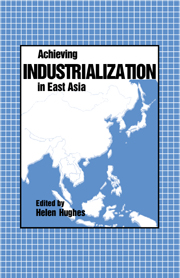Book contents
- Frontmatter
- Contents
- List of figures
- List of tables
- Contributors to this volume
- Preface
- Abbreviations
- Symbols
- 1 Economic Development in East Asia: Doing What Comes Naturally?
- 2 Industrialization and Growth: Alternative Views of East Asia
- 3 The Role of Trade Policies in the Industrialization of Rapidly Growing Asian Developing Countries
- 4 The Role of Foreign Capital in East Asian Industrialization, Growth and Development
- 5 The Role of Government in Overcoming Market Failure: Taiwan, Republic of Korea and Japan
- 6 Growth, Industrialization and Economic Structure: Latin America and East Asia Compared
- 7 Ideology and Industrialization in India and East Asia
- 8 Japan: Model for East Asian Industrialization?
- 9 The Politics of Industrialization in the Republic of Korea and Taiwan
- 10 Economic Growth in the Asean Region: the Political Underpinnings
- 11 Culture and Industrialization
- Bibliography
- Index
11 - Culture and Industrialization
Published online by Cambridge University Press: 06 October 2009
- Frontmatter
- Contents
- List of figures
- List of tables
- Contributors to this volume
- Preface
- Abbreviations
- Symbols
- 1 Economic Development in East Asia: Doing What Comes Naturally?
- 2 Industrialization and Growth: Alternative Views of East Asia
- 3 The Role of Trade Policies in the Industrialization of Rapidly Growing Asian Developing Countries
- 4 The Role of Foreign Capital in East Asian Industrialization, Growth and Development
- 5 The Role of Government in Overcoming Market Failure: Taiwan, Republic of Korea and Japan
- 6 Growth, Industrialization and Economic Structure: Latin America and East Asia Compared
- 7 Ideology and Industrialization in India and East Asia
- 8 Japan: Model for East Asian Industrialization?
- 9 The Politics of Industrialization in the Republic of Korea and Taiwan
- 10 Economic Growth in the Asean Region: the Political Underpinnings
- 11 Culture and Industrialization
- Bibliography
- Index
Summary
Culture has not been popular in recent years in explanations and analyses of development. Culture, after all, is a soft concept, neither easily pinned down in its nature nor absolutely distinguishable in its workings. This means, of course, that the influence and effects of culture are difficult to foresee and to quantify. In a world where development is increasingly identified with economic development and where economic development is bound ever moretightly to economic planning (which demands substantial measures both of foresight and of quantification) one of the reasons for the relative insignificance of cultural considerations is clear, and two others are also prominent. First, cultures are almost by definition specific, and their intrusion into discussions forces an uncomfortable compromise between universalities and particulars, between general laws and anecdotes. Second, linked with the notion that cultures are different are the seeds of the notion that the worth of cultures might be different, a notion that can all too readily be twisted into abhorrent denigration or a priori condemnation of cultural traits and of peoples who display them. Yet, to ignore culture largely on the grounds that it is awkward to deal with is both intellectually unsatisfying and potentially costly. This paper will attempt to indicate how some important aspects of culture fit, almost organically, the style of institutional arrangements underlying the rapid economic progress in some East Asian countries over the past few decades and will raise some cultural points bearing on the attempts of Southeast Asian countries to emulate the more successful of their northern neighbours.
- Type
- Chapter
- Information
- Achieving Industrialization in East Asia , pp. 327 - 343Publisher: Cambridge University PressPrint publication year: 1988
- 3
- Cited by



